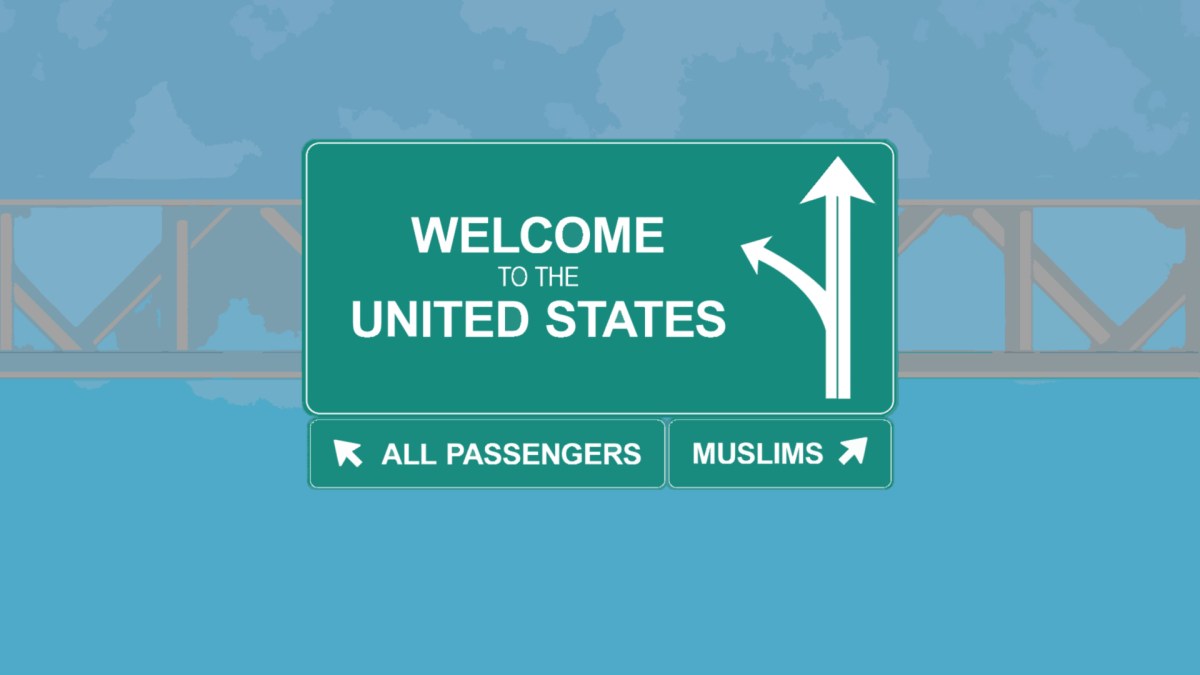It was one of the presidential campaign’s most incendiary moments: a candidate of one of the two major political parties issuing a full-throated proposal that would keep an entire faith group out of the United States.
“Donald J. Trump is calling for a total and complete shutdown of Muslims entering the United States,” the Republican presidential hopeful said on Dec. 7, 2015.
As American voters let that sink in—Trump’s supporters praising the proposal with vociferous applause while his opponents were left stunned—the businessman and reality TV star said America’s door should remain closed until “our country’s representatives can figure out what the hell is going on.”
Trump’s comments came in the wake of a horrific mass slaying in San Bernardino, Calif., which killed 14 and injured nearly two dozen others.
Americans had been on edge even before the terror attack in California. A month earlier in Paris coordinated attacks by ISIS had led to the deaths of 130 victims, including 89 attending a concert at Bataclan theatre. Islamophobia was increasingly a topic of conversation, stoked by the fear of refugees coming to the United States from Afghanistan, Syria and other war-torn countries.
As the often-vitriolic campaign for the White House wore on, Trump softened his tone to broaden his appeal; instead of a total ban, American authorities would perform “extreme vetting” of non-citizens entering our borders.
More than two weeks after the election, Americans still have an incomplete idea of what a Trump America would look like. No one—perhaps not even Trump himself—knows what to expect from his presidency. He’s toyed with the idea of creating a Muslim database, and conducting surveillance of mosques in the United States, both extremely controversial ideas. One of his advisors, Carl Higbie, even invoked the internment of Japanese Americans in 1942 as a precedent for policy.
Whatever Trump does, it is becoming worrisome to many observers that his administration will pursue some kind of immigration policy targeting refugees or people from majority Muslim nations altogether.
If not a total ban, Trump could decide to re-instate a counter-terrorism program from the President George W. Bush-era that disrupted the lives of thousands of people even though government officials later deemed it ineffective compared to the array of automated tools intelligence officials had installed in the years after the Sept. 11, 2001 attacks.
Called the National Security Entry-Exit Registration System (NSEERS), the program has its root in the controversial Patriot Act. NSEERS, which was adopted by the Department of Homeland Security (DHS), amassed a database of about 90,000 incoming non-U.S. citizens from 25 countries. All of them were predominantly Muslim countries, except one: North Korea.
Ultimately, more than 13,000 people were placed in deportation proceedings because of the program. Families were ripped apart. Of the tens of thousands affected, none were singled out for posing a threat to the United States.
On April 28, 2011, DHS issued a notice in the Federal Register spelling the ostensible end of NSEERS. DHS itself had concluded that the program was no longer needed.
Now it seems that President-Elect Trump is considering re-installing NSEERS, which still has its regulatory framework in place, much to the disappointment of immigration advocates. Had NSEERS undergone an autopsy, it would’ve read like this: a redundant and ineffective counter-terror tool fraught with bureaucratic confusion that despite its $10 million annual price tag perpetually failed to engineer a single terror investigation. In simple terms, NSEERS was an abject failure.
‘Failed Experiment’
Even those officials with close ties to the registration program are convinced NSEERS should remain on the scrap heap.
“There was no security case to be made for NSEERS because all the people who come in on Visas are interviewed and tracked, and so we don’t have to pick based on generalizations, we can just interview and track everyone,” Margo Schlanger, who was appointed by President Obama in 2010 to oversee the Office of Civil Rights and Civil Liberties at DHS, tells the Press.
Now professor of law at the University of Michigan, Schlanger came to a similar conclusion, as did officials at DHS and the agency’s Office of Inspector General: “It’s some combination of redundant and ill-advised.”
Under NSEERS, non-U.S. citizens entering the United States from the 25 designated countries were required to register with customs officials by providing fingerprints and photographs, and answering questions about their background. They were also instructed to inform a customs officer at their port-of-exit upon leaving the country. DHS eventually expanded the program to include certain men already in the United States by having them “check in” at immigration offices.
Not only did the program’s domestic agenda appear to discriminate against people who were not considered threats or even under investigation, it caught many of those who would’ve willingly complied in a bureaucratic tailspin, leaving some of them totally in the dark about what was required, immigration advocates say.
“Inadequate notice and misinformation prevented many individuals who would have complied from doing so,” said researchers at the Center for Immigrants’ Rights at Penn State Law in a 2012 report titled “The NSEERS Effect: A Decade of Racial Profiling, Fear, and Secrecy”.
“The federal government relied principally on notices in the Federal Register to inform the public of registration requirements,” the report found, “and, like the majority of the American population, most individuals subject to NSEERS were not familiar with the Federal Register or the requirements contained therein.”
Homeland security officials admitted as much in a series of memos.
At least two memos, one sent by Immigration and Customs Enforcement (ICE) in October of 2005 and the other in June 2011 after the countries were de-listed, encouraged authorities to use “prosecutorial discretion” in certain cases where the affected person had a reasonable excuse for failing to register, such as hospitalization, or in a situation in which they were “simply unaware of the registration requirements,” as the 2005 letter stated.
Officials effectually decided that using manpower to register mostly Muslim citizens from entering the United States was unnecessary.
“DHS has determined that recapturing this data manually when a non-immigrant is seeking admission to the United States is redundant and no longer provides any increase in security,” the DHS wrote in a notice placed in the Federal Register on April 28, 2011.
Instead of focusing “on more general designations of groups of individuals,” as NSEERS did, DHS preferred to identify specific individuals who pose a threat, the notice stated.
That President-Elect Trump is considering reinstating a federal program that failed has many immigration advocates concerned. Just this week, a consortium of human rights organizations, immigration advocates and concerned citizens, petitioned the Obama administration to rescind NSEERS’ regulatory framework, which still exists despite the program ostensibly ending in April 2011 after DHS de-listed all the impacted countries.
“NSEERS targeted foreign nationals from 25 countries based on religion, ethnicity, and national origin,” their letter states. “NSEERS was a discriminatory policy that ran counter to the fundamental American values of fairness and equal protection. Rescinding the regulatory framework of the program will ensure that our nation does not target communities based on national origin and faith.”
One of the groups behind the letter is the Washington, D.C.-based American-Arab Anti-Discrimination Committee (ADC), which has been raising awareness about NSEERS since its implementation.
“If you are a suspected terrorist and you’re in this country to do harm, are you going to turn yourself in at a government facility?” asks Abed Ayoub, ADC’s national legal and policy director. The answer is obvious: No, you wouldn’t. “So, the program is flawed,” Ayoub concludes.
Immigration advocates have not hid their disappointment over the Obama administration’s decision to leave the regulatory framework in place.
“All they did was take the furniture out of the house,” says Ayoub. “You can still refurnish the house.”
By only de-listing the countries, DHS did not eliminate the problem facing many immigrants who did not read the notice in the Federal Register, or “did not feel comfortable registering” because of past problems experienced by a community or family member, argues Shoba Sivaprasad Wadhia, director of the Center for Immigrants Rights Clinic at Penn State Law.
Wadhia didn’t think it was fair that a person should face the consequences of failing to register for a program considered defunct in 2011.
“The NSEERS program was a failed experiment,” she continues. “It was counter-effective or ineffective as a counter-terrorism tool. It was alienating to the communities and families it targeted. And it was discriminatory along the lines of…national origin and religion.”
So why would President-Elect Trump even consider an immigrant enforcement strategy that top officials considered superfluous? Look no further than Kansas Secretary of State Kris Kobach.
NSEERS Reboot
Kobach, a Republican who was counsel to Attorney General John Ashcroft, is considered the chief architect of NSEERS. Trump is now considering him as his possible chief of Homeland Security.
Upon leaving a meeting with Trump in New Jersey this week, Kobach bumbled his paperwork and was photographed with confidential notes in his hand. At the top of his list of ideas, clearly visible, thanks to his documents mishandling, is to “update and reintroduce the NSEERS screening and tracking system.”
Kobach’s apparent proposal would do what automated tracking systems could not: It would “add extreme vetting questions for high-risk aliens: question them regarding support for Sharia law, jihad, equality of men and women, the United States Constitution.”
Trump has not suggested whether or not he’d revive the program, and his transition team has denied he ever advocated for a registry singling out Muslims. The idea of Trump proposing a Muslim registry emerged during an interview with a Yahoo News reporter in which Trump, when asked, said, “We’re going to have to look at a lot of things very closely. We’re going to have to look at the mosques. We’re going to have to look very, very carefully.” The discussion got even more convoluted from there, with Trump invoking a wall on the US-Mexico border amid questions about a registry. Trump, however, never unequivocally rejected such a policy.
During a rally in Alabama shortly after the topic was broached, Trump said a “watch list is okay, and surveillance is okay.” He later added: “But I do want databases for those people coming in, but I also insist on a wall.”
Ambiguity aside, it’s Trump’s past statements about Muslims that disturbs advocates most.
“NSEERS is a discredited program that was shelved in 2011 because it did not make our nation any more secure or safe, and it only relied on the racial and religious profiling of Muslims traveling to the United States,” Robert McCaw, government affairs director for the Council on American Islamic Relations Government Affairs, told Talking Points Memo last week.
When a top Trump surrogate, Carl Higbie, recently told Fox News‘ Megyn Kelly that World War II-era internment of Japanese Americans serves as a precedent for establishing some form of Muslim registry here, several groups, including the American Civil Liberties Union, were quick to offer a stinging rebuke.
“If the Trump administration proceeds to discriminate against our Muslim neighbors, families, and friends, we will sue,” said Cecillia Wang, director of the American Civil Liberties Union’s Immigrants’ Rights Project, on its website.
As Trump’s transition continues, Americans, especially Muslims and other immigrants, are are wary about what’s to come.
“Right now there’s no telling what the next administration is going to do,” says Ayoub of the ADC. “We just got to focus on making sure this administration rescinds this program. We are prepared for whatever comes next. We’re mobilized. We’re energized. We’re not afraid.”
And what if Trump reinstates a Bush-era registration program that many advocacy groups remain convinced clearly and unfairly targeted Muslims under the guise of national security?
“We’re prepared for anything,” says Ayoub.






























